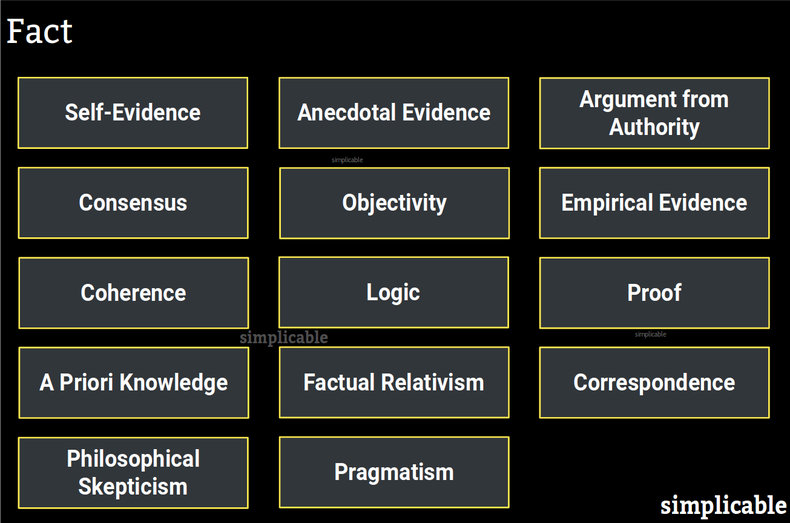

Self-Evidence
A statement that is considered obviously true such that any rational person would confirm it. This relies on the idea of a rational person and tends to be a weak argument. However, in practice, self-evidence is used all the time because it is an efficient approximation of the truth. For example, if 99.5% of people who've seen a movie say it was a comedy this can be considered a fact according to the self-evidence approach to truth.Anecdotal Evidence
Anecdotal evidence is information that originates from a single event or an individual's experience. This can be used to establish certain facts such as the fact that a particular person has been to Germany. However, applying anecdotal evidence to far reaching theories is an extremely weak way to establish fact. For example, if a person has been to Germany once and they found that all Germans drink a lot of milk this can't be considered a fact. The evidence from a single person is not statistically significant and is prone to cognitive biases.Argument from Authority
A fact that is offered by an authority on a topic. For example, a transit authority that offers annual ridership numbers for the train system of a city. If an individual or organization is an authority on a topic it may be reasonable to accept their data as fact.Consensus
The consensus theory of truth states that things are true because they are generally agreed to be true by a group such as a society, culture, organization or profession. This can be combined with an argument from authority whereby consensus amongst authorities is viewed as factual. For example, if most doctors believe that smoking is unhealthy then this would be accepted as fact according to the consensus theory of truth.Objectivity
Objectivity is the principle that a fact is only fully valid if those who produced it are solely motivated by a desire to find the truth. In other words, a motivation such as financial reward or social status may lead an authority to produce inaccurate statements that can't be considered fact. For example, if a scientist is paid large sums of money by a company to confirm that the company's products are safe, that scientist may have motives other than the truth and can't be considered fully objective. Likewise, people may have emotions that cloud their objectivity around issues that they feel strongly about or that personally affect them.Empirical Evidence
Information obtained through the senses that verifies the truth or falsity of a theory. For example, a student who measures the temperature at which water boils to confirm the theory this is around 100°C or 212°F at sea level.Coherence
The coherence theory of truth states that the truth of a theory consists in its coherence with established truths of a system. For example, if a scientific study finds empirical evidence that a compound cures a disease the coherence theory of truth demands an explanation that is consistent with accepted medical knowledge. In other words, a theory is not considered factual unless it is consistent with accepted facts.Logic
Logic provides a system for inferring new facts from established facts. This is garbage-in-garbage-out as logic depends on these established facts for its validity. If an axiom is invalid, the resulting logic can be invalid.Proof
A proof is a logical argument based on assumed statements, known as axioms. For example, it is common to prove that a mathematical statement is valid using the foundational principles of mathematics.A Priori Knowledge
A priori knowledge is your starting set of assumptions when investigating fact. Nobody reinvents the world and we all rely on basic assumptions to investigate truth. For example, a scientist studying weather may assume that established systems of mathematics are correct.Factual Relativism
Factual relativism is the idea that facts themselves are inherently relative and subjective. For example, it is mostly considered a fact that nothing can move faster than the speed of light. However, according to the Hubble Constant distant galaxies are moving away from each other at speeds greater than the speed of light. In other words, accepted physics states that the speed of light can't be exceeded unless you are talking about the relative positions of things that are extremely far apart from each other. This type of inconsistency is common in physics suggesting that there may be some value to the idea of factual relativism. However, from a practical perspective, facts do exist independently of your point of view just as from a practical perspective you can't move faster than the speed of light.Correspondence
The correspondence theory of truth states that facts are only relevant to how well they describe a world. In other words, you don't need to prove that something is universally true for it to be a fact. This is helpful as it discards ideas such as "nothing is real" as these aren't very helpful to describing the world as we experience it.Philosophical Skepticism
The demand for certainty and the skepticism that anything can be proven with certainty. This isn't very helpful for developing facts and tends to quickly escalate to philosophical questions that nobody can answer with certainty such as "how can you trust your senses?"Pragmatism
Pragmatism is an approach to thought that describes subjective reality and not universal reality. In other words, facts are tested against human experience as opposed to universal truths. For example, if people commonly believe that music has value a pragmatist would say this is true.Notes
It is a common myth that facts are indisputable. Nothing is indisputable and it is common for something that has been considered fact to be proven wrong using the techniques above. This is a valuable process that defeats invalid knowledge and improves the quality of knowledge over time.| Overview: Fact | ||
Type | ||
Definition | A statement that is known to be true. | |
Related Concepts | ||







































